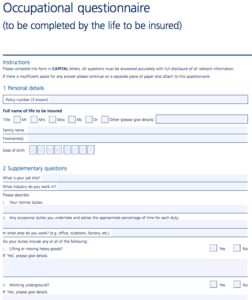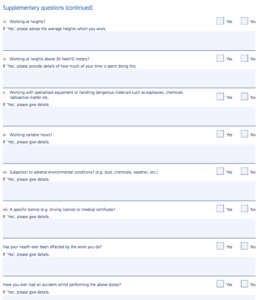 When you complete a life insurance application, the insurance company is interested in more than just your health and how much cover you are applying for. A life insurance company will want to know about your family history, any dangerous sports or hobbies you take part in and also the job that you do.
When you complete a life insurance application, the insurance company is interested in more than just your health and how much cover you are applying for. A life insurance company will want to know about your family history, any dangerous sports or hobbies you take part in and also the job that you do.
High risk / hazardous life insurance occupations explained
Insurance companies employ underwriters, whose job is to look at the applications they receive in detail assessing additional risk factors, such as health, family history, dangerous sports and high-risk occupations. If you do one of the jobs listed below, you should expect to be asked further information about your job, often referred to as an 'occupational questionnaire'. How you answer those additional questions will determine whether you get accepted at 'standard rates' (no increase to the life insurance premium), accepted with a 'rating' or 'loading' (you are offered a higher premium than you were quoted) or you may even be postponed or declined cover. Below we have listed the high risk/hazardous occupations that the insurance industry is likely to ask for additional information about.
Examples of high risk / hazardous jobs
- Working at heights (e.g. roofers, tree surgeons, scaffolders etc)
- Building trade / Construction worker
- Commercial Diver (e.g. emergency services, oil or gas etc)
- Armed forces (e.g. RAF, Navy or Army etc)
- Emergency Services (e.g. police, ambulance, fire service, RNLI etc)
- Working underground (e.g. miner)
- Offshore workers
- Aviation (e.g. helicopter, private pilot, commercial pilot etc)
- Professional sportsperson
- Security worker
What is an occupational questionnaire?
If you work in a high-risk/hazardous occupation and you apply for life insurance then you may be asked to complete an occupational questionnaire. The questionnaire provides an insurance underwriter with the additional information that they need to understand the duties of your job and assess the higher risk of death your occupation may pose. The two images below are from an occupational questionnaire from Zurich and should give you an idea of the sort of questions you will be asked. (click to enlarge)
Occupational risk factors that are likely to increase your premiums
- Regularly working at heights over 50 feet
- Regularly working underground
- Working with explosives or firearms
- Working in high-risk locations
- Working abroad for long periods
- Working with hazardous chemicals/substances
How you can avoid an increase in your life insurance premiums for your high-risk job
If you work in a particularly dangerous job, an increase in your life insurance rates can be unavoidable. However, there is a way that you can get the best premiums by simply shopping around. All insurance companies use underwriters to assess the risk of their applicants and each insurer will have its own set of guidelines to determine how what you do for a living will affect life insurance. This means that just because one insurance company increased your premiums for your high-risk job, it doesn't mean that every insurer would. You, therefore, need to ensure that you apply to the right insurance company from outset.
We have provided an example below:
Armed Forces
AIG and Royal London would automatically apply an increase of £2 per £1,000 insured, irrespective of whether you are UK based or under orders. That means that for £100,000, you would automatically get charged £16.67 per month on top of your standard premium. Legal & General and Canada Life however would not apply an increase.
Life insurance quotes for someone in the Armed forces, pre-underwriting
| Armed Forces | Standard Quote / Pre Underwriting |
| AIG | £12.67 |
| Royal London | £13.20 |
| Legal & General | £14.26 |
| Canada Life | £14.87 |
Life insurance quotes for someone in the Armed forces, post-underwriting
| Armed Forces | Standard Quote | Underwriting Decision | Final Premium |
| Legal & General | £14.26 | No increase | £14.26 |
| Canada Life | £14.87 | No increase | £14.87 |
| AIG | £12.67 | £2 per mille increase | £29.34 |
| Royal London | £13.20 | £2 per mille increase | £29.87 |
So even though AIG was the cheapest life insurance quote at the quote stage, the cheapest and best life insurance for someone in the armed forces would likely be through Legal & General.
The above highlights the importance of doing your research before you apply and getting in touch with the right insurance company from the outset.
How to guarantee the cheapest life insurance premiums for high-risk occupations
Online life insurance calculators and online comparison sites are not sophisticated enough to understand the nature of your job and provide an accurate life insurance quote. It can also be incredibly time-consuming having to phone around every insurance company yourself. An independent life insurance specialist will be able to do all of the research on your behalf and they have the knowledge and experience to put you in touch with the best insurer for your own personal circumstances.
An independent specialist can also guide you through the application forms, chase the insurance company on your behalf and even help you to put it into trust, meaning any claim is paid swiftly and directly to your dependants to provide financial security without the need for inheritance tax. We have summarised the reasons why you should use an independent specialist below
Why it is best to buy life insurance through an independent specialist
- guarantee the best quotes for your personal circumstances
- expert knowledge
- help with filling in the forms
- chase the insurance company on your behalf
- no cost to you for the service they provide
- can place policy into trust (for free) ensuring no inheritance tax is paid on the proceeds
We have personally vetted the services of a specialist insurance broker*, which specialises in finding the most suitable cover for those with high-risk occupations.
To speak to an adviser, with no obligation to take things further, click the link above and complete the short form. The firm employs strong ethics and will only ever offer a policy if it is the best policy to suit your needs, something we have witnessed first hand when we recently visited their offices. You'll receive up to £100 cashback if you take out a recommended life insurance policy.
If a link has an * beside it this means that it is an affiliated link. If you go via the link, Money to the Masses may receive a small fee which helps keep Money to the Masses free to use. The following link can be used if you do not wish to help Money to the Masses and do not wish to qualify for the cashback referred to in the article – LifeSearch








